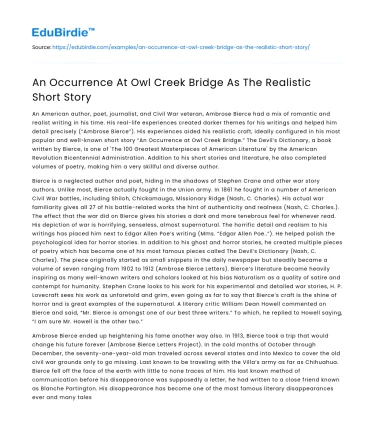An American author, poet, journalist, and Civil War veteran, Ambrose Bierce had a mix of romantic and realist writing in his time. His real-life experiences created darker themes for his writings and helped him detail precisely (“Ambrose Bierce”). His experiences aided his realistic craft, ideally configured in his most popular and well-known short story “An Occurrence at Owl Creek Bridge.” The Devil’s Dictionary, a book written by Bierce, is one of 'The 100 Greatest Masterpieces of American Literature' by the American Revolution Bicentennial Administration. Addition to his short stories and literature, he also completed volumes of poetry, making him a very skillful and diverse author.
Bierce is a neglected author and poet, hiding in the shadows of Stephen Crane and other war story authors. Unlike most, Bierce actually fought in the Union army. In 1861 he fought in a number of American Civil War battles, including Shiloh, Chickamauga, Missionary Ridge (Nash, C. Charles). His actual war familiarity gives all 27 of his battle-related works the hint of authenticity and realness (Nash, C. Charles.). The effect that the war did on Bierce gives his stories a dark and more tenebrous feel for whenever read. His depiction of war is horrifying, senseless, almost supernatural. The horrific detail and realism to his writings has placed him next to Edgar Allen Poe’s writing (Mms. “Edgar Allen Poe..”). He helped polish the psychological idea for horror stories. In addition to his ghost and horror stories, he created multiple pieces of poetry which has become one of his most famous pieces called The Devil’s Dictionary (Nash, C. Charles). The piece originally started as small snippets in the daily newspaper but steadily became a volume of seven ranging from 1902 to 1912 (Ambrose Bierce Letters). Bierce’s literature became heavily inspiring as many well-known writers and scholars looked at his bias Naturalism as a quality of satire and contempt for humanity. Stephen Crane looks to his work for his experimental and detailed war stories, H. P. Lovecraft sees his work as unforetold and grim, even going as far to say that Bierce’s craft is the shine of horror and is great examples of the supernatural. A literary critic William Dean Howell commented on Bierce and said, “Mr. Bierce is amongst one of our best three writers.” To which, he replied to Howell saying, “I am sure Mr. Howell is the other two.”
Save your time!
We can take care of your essay
- Proper editing and formatting
- Free revision, title page, and bibliography
- Flexible prices and money-back guarantee
Ambrose Bierce ended up heightening his fame another way also. In 1913, Bierce took a trip that would change his future forever (Ambrose Bierce Letters Project). In the cold months of October through December, the seventy-one-year-old man traveled across several states and into Mexico to cover the old civil war grounds only to go missing. Last known to be traveling with the Villa’s army as far as Chihuahua. Bierce fell off the face of the earth with little to none traces of him. His last known method of communication before his disappearance was supposedly a letter, he had written to a close friend known as Blanche Partington. His disappearance has become one of the most famous literary disappearances ever and many tales and stories have been created in attempts to let his name live on. His disappearance has been given many wild heart racing stories of him dying in one last battle, whereas others are simple stories of his demise, saying he died from asthma (Nash, C. Charles). Multiply people came to investigate the American author’s disappearance but sadly came up with nothing. The original evidence of the final letter was said to be destroyed and only evidence of the letter’s existence was recorded in Carrie Christiansen’s summary report. All investigations were proven fruitless and no hard evidence of his disappearance turned up, leaving the disappearance of Ambrose Bierce shrouded in mystery.
Bierce left his mark on America for sure. His works inspired many such as Ernest Hemingway, Stephen Crane, and many more. His horror fiction was ranked beside Edgar Allen Poe and H. P. Lovecraft. More than fifty novels, movies, magazine clips, short stories, poems comic books, plays and shows have been based about him. Bierce’s work was transformed into so much more than it was. Short films, television shows and movies were created after his works. “An Occurrence at Owl Creek Bridge” had been portrayed and filmed three different times. About two versions of his own “Eyes of the Panther” was released, both classic short films. Even Bierce’s own character was featured and inspired in other films and books. Many believed that if it were not for the war then Bierce would have never become the successful writer and man he was. Bierce’s stories, life and disappearances all became an inspiring act for others and helped create a world of mystery and horror around his name. Ambrose Bierce became a popular and well-liked man for his horrific outtake on the war and his shallow skill of putting it into words, creating his very own well-liked style of vague yet powerful literature.
As a realist author, poet, Civil War veteran, and journalist, Ambrose Bierce disappeared from the earth with a heavy mark left. His writings had inspired many comrades in the literature world and realistic and detailed writing made him a popular English choice. With his real-life experiences leading to the start of his adventures in writing, they also lead to the end. Bierce impacted American greatly and helped making a literary change forever.






 Stuck on your essay?
Stuck on your essay?

